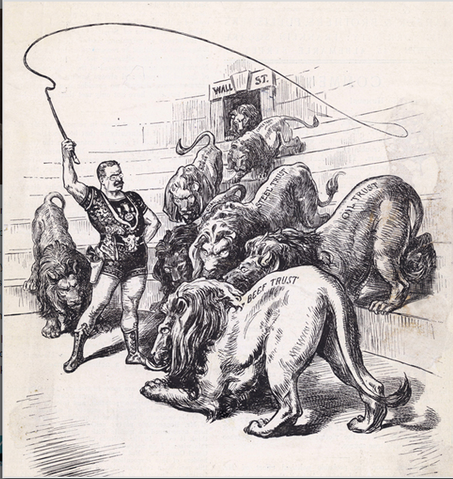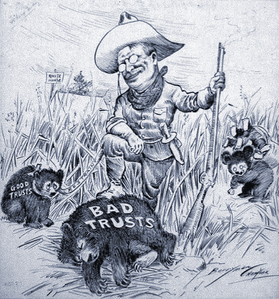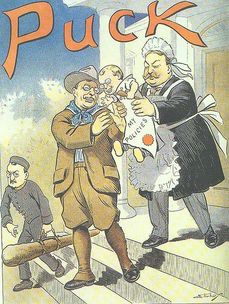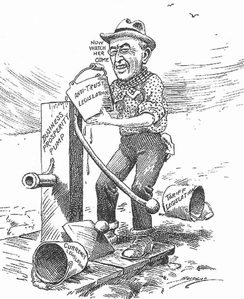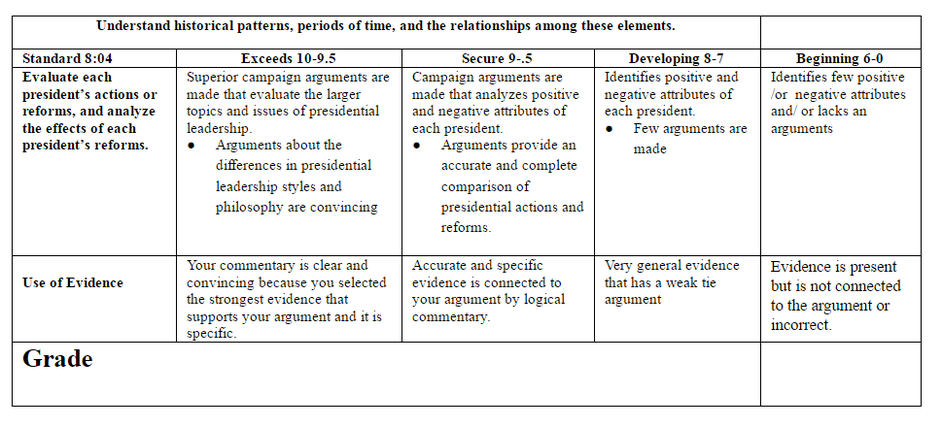Progressive Presidents
Essential Question: How well did Presidents Roosevelt, Taft, and Wilson promote progressive goals in national policies? Do they believe in a laissez faire government?
Project: You will be making a campaign poster for your president. You will need to be able to convince Mrs.Angus and your classmates to vote for your person with specific facts from class. Also you will need to be able to defend your choice. It is to your benefit to know the other positions to make your case stronger. Rubric is down below.
Project: You will be making a campaign poster for your president. You will need to be able to convince Mrs.Angus and your classmates to vote for your person with specific facts from class. Also you will need to be able to defend your choice. It is to your benefit to know the other positions to make your case stronger. Rubric is down below.
Outline of Events
|
1) Read and take notes over your person.
2) Check in with two other people who did the same president. 3) Complete a formative check and be ready to present to two others. 4) Teach two other people about your person and take group formative. |
5) Complete the chapter 18 reading challenge on TCI independently.
6) Make campaign poster and prepare short speech and be ready to defend yourself. 7) Caucusing in Angus' room |
You will need to become an expert at knowing this president. You will be teaching two others about your person. Make sure to fill out you notes completely!
|
On February 22, 1902, the rich financier J. P. Morgan went to the White House to see President Theodore Roosevelt. Morgan had a dispute to resolve with the president. Roosevelt had recently ordered the Justice Department to file a lawsuit against Northern Securities Company, of which Morgan was part owner, for antitrust violations.
Northern Securities was a holding company, a business that controls other companies by buying up a majority of their stock.Morgan and other businessmen had created this holding company to control the long-distance railroad lines from Chicago to California. By the time the Roosevelt administration filed suit against him, Morgan held a monopoly on rail service in the Northwest. Morgan believed it would be easy for the two men to settle their differences. "If we have done anything wrong, send your man to my man and they can fix it up," he told Roosevelt. But Roosevelt disagreed. He didn't like it when big business treated government as an equal, or worse, as its servant. "That can't be done," he told Morgan. Two years later, in 1904, the Supreme Court ruled against Northern Securities. "Trustbusting" was one of a number of progressive reforms enacted at the national level in the early 1900s. In addition to local and state issues, progressives were also concerned about problems in the country as a whole. Many of them believed that the national government no longer served the interests of all Americans. In an age when big business seemed all-powerful, many reformers felt the United States was abandoning its promise of freedom and opportunity for all. They wanted the government to play a stronger role in promoting democracy and solving national problems. |
The framers of the Constitution wanted the president to have prestige but not too much power. Many feared what might happen if the chief executive became too powerful. As the presidency evolved during the Progressive Era, Americans began to change not only their ideas about what the national government should do, but also their views about how strong the president should be.
The three presidents of the Progressive Era—Roosevelt, Taft, and Wilson— held office between 1901 and 1921. Although differing in many ways, they shared a commitment to reform. They challenged the economic and political power of the industrial giants and worked to end government corruption. In the process, all three of these leaders expanded the power of the presidency.
The three presidents of the Progressive Era—Roosevelt, Taft, and Wilson— held office between 1901 and 1921. Although differing in many ways, they shared a commitment to reform. They challenged the economic and political power of the industrial giants and worked to end government corruption. In the process, all three of these leaders expanded the power of the presidency.
Written content is completely from: Hart, Diane, and Bert Bower. History Alive!: Pursuing American Ideals. Palo Alto, CA: Teachers' Curriculum Institute, 2008. Print.
